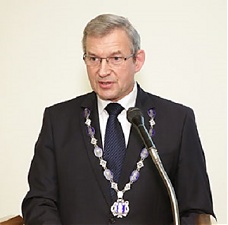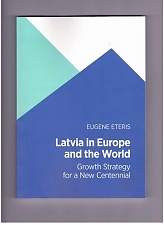Analytics, Book review, Education and Science, Latvia
International Internet Magazine. Baltic States news & analytics
Wednesday, 24.12.2025, 09:59
Scientific impetus into the Latvian centennial
 Print version
Print versionCombining external and internal factors
 |
|---|
The Latvian centennial book’s idea*) has been to provide
Latvian politicians, economists and the general public with a modern analysis
of the challenges facing country’s modern socio-economic development. The
author takes Latvian challenges from two sides” from external factors (e.g.
from the European Union’s side and from the globalization processes in general),
and from internal, so-to-say Latvian socio-economic and political factors.
Still another book’s sub-idea is to introduce to the public
a new
Latvian narrative in a fruitful effort to connect the political ideas
and government efforts (through the national governance structures) with the
ordinary lives of Latvian people. In author’s view, a narrative is an account
of events and experiences, a sort of “story” that connects and explains a set
of challenging events.
*) Eteris E. Latvia in Europe and the world; growth
strategy for a new centennial. –Zinatne Publish., Riga, Latvia. 2018. – 208
pp. ISBN 978-9934-549-55-7.
The book consists of three parts: the first is devoted to
analysis of global and European challenges for Latvian development, the second
describes formation of Latvian political economy through the modern narrative,
and the third part addresses Latvian growth perspectives through new
challenges. The book is attractive and quite easy for reading: each book’s
chapter (there are 16 chapters in the book) has an introduction, a resume with extensive
notes and references. An inquisitive reader can enlarge apprehension of the
country’s future by following the extensive references.
Important aspect of the book is to show the ways the EU and
international challenges are affecting Latvian political and economic
decision-making process; the latter is subject to dynamic changes in order to
make Latvian socio-economic development progressive in line with the EU and
global sustainability requirements. Important in the EU’s economic planning’s
effect on Latvia is the role of European legal instruments (e.g. regulations
and directives) on Latvian economy: the share of the EU’s laws in Latvian
legislation is presently at the level of 60-70 per cent. It doesn’t mean that
Latvian decision-makers are losing initiatives; on the contrary, it means that
European integration guidelines are playing greater role in the member states’
development.
Latvia joined OECD
in 2016; in September 2017, the OECD presented its first analytical analysis of
Latvian economic development with about 200 pages in 2 booklets. According to
the OECD’s accounts, there are both positive and critical assessments for
Latvia; therefore, a lot is to be done by Latvian political and economic elites
to deliver on these recommendations. Short review of Latvian economy from the
OECD’s experts underlines necessary changes in national priorities.
Besides, recent global economic outlook
made by OECD group signifies the necessity of new approaches to political
economy, i.e. through the active government actions in supporting the
role of SMEs in national growth.
A vital part of the book is dealing with the global/European
sustainability issues and their effect for Latvian growth strategy. Politicians,
economists and business community feel the need for changes and new approaches
to development. Global competition for resources is increasing; at the same
time, concentration of resources outside the EU states, particularly in
critical raw materials, makes European industry dependent on imports, being
increasingly vulnerable to high prices, market volatility, and political
situation in supplying countries.
Narrative issue
 |
|---|
Probably, the narrative issue in the author’s approach is
becoming more productive for Latvian growth in several instances: from
stimulating national public space, to creating a “shared purpose” among citizens,
to activating cultural spheres, to increasing Latvian role in Europe and
globally. Author suggests that the narrative for Latvia will be a “theoretical catalyst”
triggering intellectual contribution to country’s progressive future formed
with the shared European values and experiences.
Important that the narrative will demonstrate the ways in
which Latvian political and economic elites can empower citizens through
identifying cultural values on the European platform of shared values in the
European social market economy.
Latvian narrative aims at connecting Latvian public with the
European values and concepts of integration, mobilizing “Latvian spirit”
towards more ambitious goals. However, as the author correctly notices, in
order for the Latvian narrative to materialize, there shall be established a
“social contract” among Latvians coped with a strong social drive in line with
the EU’s narrative idea, to pave the way to a well-functioning Latvian
political economy.
Importance of the Latvian narrative shall be in designing the
optimal and progressive national development directions based on the EU
political/economic guidance as well as the challenges from globalization and
the 4th industrial revolution. The European Union’s idea of smart
specialisation strategy (so-called 3S platform) for the member states makes it
easier for the Latvian political economy to proceed along the already
scientifically designed paths in progressive development. The role of
politicians is to deliver these ideas to the general public and see it that
Latvian establishment correctly implements them.
New Latvian narrative has several aims and ideas: from
stimulating national public space, to creating a “shared purpose” among
residents, to activating cultural spheres, to increasing Latvian role in Europe
and globally. A narrative for Latvia will be a sort of catalyst that could
trigger more intellectual contribution to country’s progressive future formed
with the shared European values and experiences. It aims to demonstrate the
ways in which Latvia can empower its citizens through identifying its cultural
values on the European platform of shared values in the European social market
economy.
Latvian narrative is an initiative and design to connect the
Latvian public with the European values and concepts of integration, mobilizing
“Latvian spirit” towards more ambitious goals.
In order for the Latvian narrative to materialize, there
shall be established a “social contract” among Latvian coped with a strong
social belief in contributing to Latvian “political body” in line with the EU’s
narrative idea, which will pave the way to a well-functioning Latvian political
economy.
Then, Latvian narrative shall be an evolving instance, which
includes the national development directions, the EU political/economic
guidance and challenges from the globalization and the 4th
industrial revolution. The European Union’s idea of smart specialisation strategy
(so-called 3S platform) for the member states makes it easier for the Latvian
political economy to proceed along the already scientifically designed paths in
progressive development. The role of politicians is to deliver these ideas to
the general public see that the Latvian community is correctly implementing
them.
Latvia is currently living through a time of sweeping
transformations: a new generation of Latvians is appearing to shape the new
narrative: Latvian community has to “write its own new history” based on past
and present achievements while oriented towards future. This is a unique and
innovative path that Latvians should be proud of. Hence, the book has an
additional importance: serving as a guiding reference for the coming elections.
Constructive ideas from the book can help politicians to deliver on their
promises to Latvian community at the parliament/Saiema’s elections.
In the conclusion it has to be mentioned that the book
provides a good ground for productive reading both for political/economic
elites and the general public. No doubt, it will be met with interest by all
people interested in the Latvian socio-economic development. Besides, the
author has shown a stimulating interest in analysing European issues: during the
last decade it is his fifth book published in Latvia, generally at the RSU’s
European Studies Faculty.








 «The Baltic Course» Is Sold and Stays in Business!
«The Baltic Course» Is Sold and Stays in Business!

